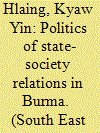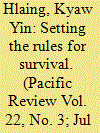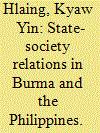| Srl | Item |
| 1 |
ID:
050873


|
|
|
|
|
| Publication |
Jan-Feb 2004.
|
|
|
|
|
|
|
|
|
|
|
|
|
|
|
|
| 2 |
ID:
078922


|
|
|
|
|
| Publication |
2007.
|
| Summary/Abstract |
This paper, based largely on interviews, examines relations between the state and a number of societal groups - business, students, the sangha (monks), peasants and workers - in Burma since independence. It argues that state-society relations in Burma cannot be reduced to a series of zero-sum games. Although it is possible that the relations between the state and anti-state activists, such as students and monks, would take the form of zero-sum games, it is argued here that existing studies fail to explain the complexity of the state's relations with those segments of the Burmese population not actively opposed to the state, such as the business community. The paper explores the mutually empowering aspect of state-society relations in Burma by highlighting the benefits that both post-colonial Burmese government officials and various societal groups have gained from their patronage networks. It further shows that, although the parliamentary period was a more democratic one than the two subsequent military periods, the bedrock of state-society relations in Burma throughout the post-colonial period has been clientelism
|
|
|
|
|
|
|
|
|
|
|
|
|
|
|
|
| 3 |
ID:
089922


|
|
|
|
|
| Publication |
2009.
|
| Summary/Abstract |
Regardless of its growing unpopularity, the ruling military junta in Burma remains far stronger than any of its foes in the country. This article probes how the junta managed to remain in power for such a long time. The answer lies in the informal procedures that governed the way leading members of the junta dealt with their differences and disagreements with their colleagues. Deriving from the rules of engagement within the military established by former military dictator Ne Win, two features came to epitomize the organizational culture of the Tatmadaw (armed forces). The first of these is the maintenance of incriminating evidence against senior members of the military in the event that they fall out of favour or need to be disciplined. The second feature of this culture that has now taken root is the observance of discrete domains of operation. This latter feature allows for the dissipation of tension between officers who are unable to get along well with each other. Importantly, it also prevents a senior officer from acquiring sufficient power to challenge more senior officers within the Tatmadaw hierarchy. Once certain rules became established norms of the Tatmadaw, they came to influence the actions and strategies taken by military officers. The rules that governed the ways military officers interacted with the colleagues they did not get along with and the incentives the Tatmadaw as an organization has created for its members have kept it together. Therefore, regardless of external and internal pressures, the army remains the most organized institution in Burma and appears to be more unified now than ever before.
|
|
|
|
|
|
|
|
|
|
|
|
|
|
|
|
| 4 |
ID:
074921


|
|
|
| 5 |
ID:
113981


|
|
|
|
|
| Publication |
2012.
|
| Summary/Abstract |
Since the new government took power in 2011, the citizens of Myanmar have enjoyed a greater degree of freedom than at any time since the military seized power in 1962. This article explains how the recent political changes in Myanmar have come about. In so doing, it argues that the absence of a rigid paramount leader who opposes reconciliation with the opposition leader Aung San Suu Kyi, the challenges posed by serious economic problems and positive responses from Western countries and pro-democracy leaders in Myanmar have allowed liberals in the government to work together for the further liberalization of the country's political system. However, Myanmar still has a long way to go before it can become a full-fledged democracy. There still are hardliners in both camps who are unsatisfied with the pace of reforms: hardliners in the government think that the pace of reform is too fast while hardliners in the pro-democracy movement feel that they are too slow. Both groups could still generate instability in the country, prompting a military coup. Myanmar is at the crossroads and the cooperation between all sections of society will allow the country to become a full-fledged democracy.
|
|
|
|
|
|
|
|
|
|
|
|
|
|
|
|